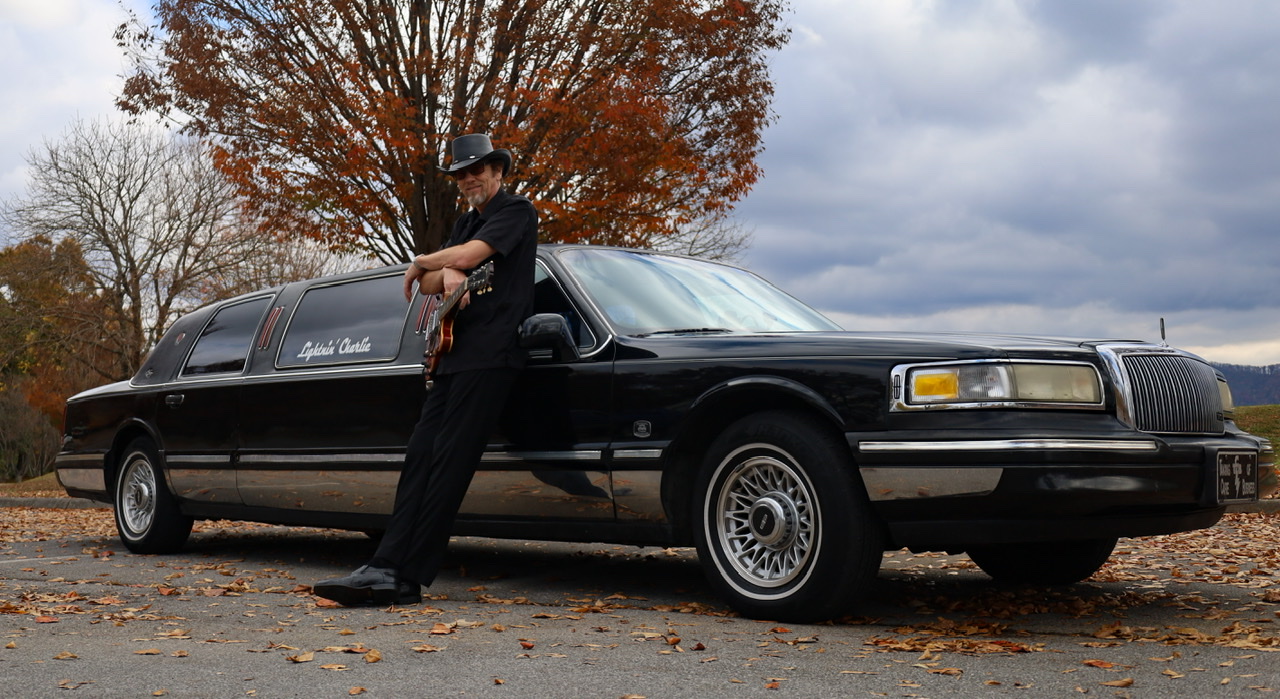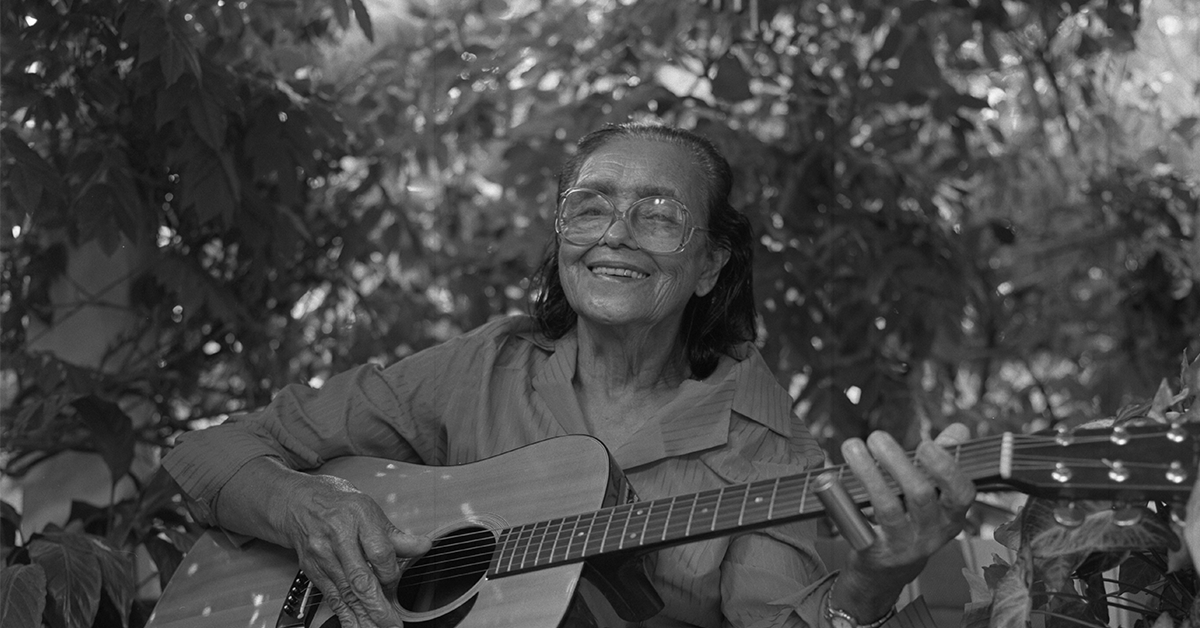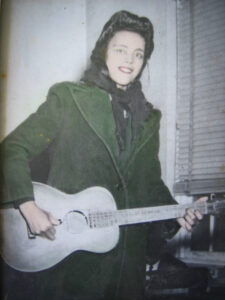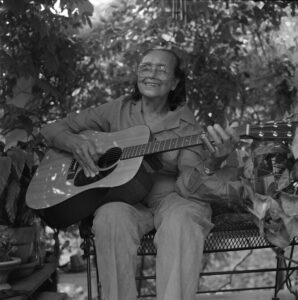By Ella Patrick Radio Bristol Production Assistant
Radio Bristol is proud to offer a platform to local and regional artists who are often underrepresented on a national level yet deserving of that audience. In expanding upon Radio Bristol’s core mission we are pleased to bring you our latest series – Radio Bristol Spotlight. Radio Bristol Spotlight is a series highlighting the top emerging artists in our region. Through interviews and performance, we will learn more about the musicians who help to make Central Appalachia one of the richest, and most unique musical landscapes in the world.
Songwriter, storyteller, and soul-seeker local “songbook man” Lightnin’ Charlie recently paid a visit to Radio Bristol. Decked out in a velvet burgundy 3 piece-suit, and a black flat-topped cowboy hat, Charlie shared songs from his forthcoming release Life, and spoke with us about his journey as a working musician in the Tri-Cities. Well known in the area as a longtime staple in the music scene, Lightnin’ is also known for his magnetic personality and eclectic style, and can regularly be spotted cruising down State Street in his vintage Lincoln Limousine with the words “Lightnin’ Charlie” streaked down the side. “Lightnin’” has been a working musician since the mid 1980’s, making “good music for good people” and possesses all the musical chops and sordid stories of late night bar brawls to prove it.
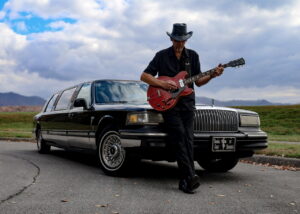
Charlie started things off in the studio with an unbelievably good cover of “Everybody’s Talkin’ At Me”. Accentuated by his silky blues-tinged voice, Lightnin’ played his expertly crafted rendition of the tune made a hit by Harry Nilsson in the late 1960s. Charlie shared with us that his musicality has always had a wide scope encompassing sounds from 60’s pop, classic rock, rootsy delta blues, and reflects his lifetime obsession with Elvis Presley, and his ability to effortlessly blend together different styles of music. When talking to Charlie you recognize instantly that he has an incredible depth of musical knowledge with a massive rolodex of a repertoire spanning multiple genres and decades.
His repertoire and original music has won him regional accolades. He’s been voted favorite musician of the mountain south by Marquee Magazine several years in a row, and nationally he’s won awards such as best in piedmont blues at the International Blues Challenge held annually in Memphis, TN. Over the years Charlie has opened for countless large nationally touring acts such as BB King, Bobby Blue Bland, The Fabulous Thunderbirds, and Albert Collins. He even joked with me about Garth Brooks opening for him when Garth was just getting started at the National Guard Armory in Johnson City, Tennessee and about how he once taught Kenny Chesney how to plug in an XLR cable to a microphone. More recently Charlie ended a four year long residency at The Barrel House in Jonesborough, Tennessee that was always sold out, and extremely well attended by his large group of fans known affectionately as “The Lightnin’ Bugs”. You can find where Charlie will be performing, and catch his online stream of “The Lightnin’ Charlie Show” on his Facebook page
Charlie began “playing out” while attending college at East Tennessee State University, when Walnut Street was “a happening” teaming with late night venues such as Poor Richards, and Quarterbacks. Local acts would be stacked up burning the midnight oil for college kids, and crowds that poured out of famed Johnson City historic venue, The Down Home. Known back then as Chip Dolinger, “Charlie” stumbled onto the scene and by his words when he accidentally became a lead singer when the band he was playing guitar for auditioned singers and couldn’t find the right fit. The then pre-med student found himself with gigs piling up, and gained his moniker “Lightnin'” from a friend who was sitting in the crowd at a show and said you playing like you were struck by lighting! Lightnin’ Charlie has tons of tales about his adventures of being a working musician and has compiled them in his book, Lightnin’ Charlie Off the Record the Trials and Tribulations of a Travelin’ Troubadour.
Another song Charlie shared with us on air that will be featured in his forthcoming release was originally written by Washington state folkie, Danny O’Keefe; Good Time Charlie’s Got the Blues. His version was recorded just before the pandemic at a Canadian based studio; Mushroom Studios. Charlie and his wife Elizabeth who regularly sings backup for his project happened on the recording space while visiting her brother in Canada. The studio houses a slew of vintage recording equipment collected from Bill Putnam’s United Western Recorders, considered legendary for turning out such albums as Brian Wilson’s production of the Beach Boys’ Pet Sounds, and recording countless artists such as Sam Cooke, Frank Sinatra, Ella Fitzgerald and many many more! Lightnin’ Charlie’s new release is due out in spring of 2023 and is sure to wow his fanbase. To keep track of upcoming releases and learn more about Lightnin’ Charlie’s upcoming projects visit his website.
Charlie closed out on air with an original song dedicated to his son called “The Gift of Wisdom”. The heartfelt acoustic tune instills tidbits of wisdom collected from a life well lived. One thing any listener can’t help but notice about Charlie is the joy he experiences from telling stories through music, a joy which is as uplifting as it is infectious. Artist’s such as Lightnin’ Charlie are the bread and butter of working musicians in this area, and we’re thankful to spotlight artists who continue to produce new exciting music throughout their career. Check out Charlie’s live performance in our studio and keep your ear to the ground for his new album Life.
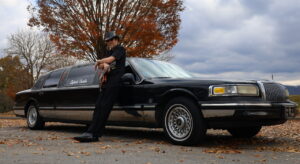
Ella Patrick is a Production Assistant at Radio Bristol. She also hosts Folk Yeah! on Radio Bristol and is a performing musician as Momma Molasses.


